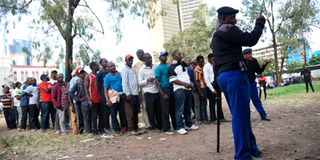It is your right and responsibility to come out on Tuesday, August 9 and cast your vote

People queue to vote at the NSSF polling in Starehe constituency on April 14, 2022, during the UDA party's nominations.
What you need to know:
- By not voting, you participate in putting bad leaders in office.
- If you are among the seven-to-eight per cent undecided registered voters, the manifesto is a great place to start.
The general election is here. And not a moment too soon.
The strain and stress of the campaign trail are already evident in the physical appearance and emotional outbursts of some of the leading contestants.
The tired and haggard looks aside, it is the outbursts that should worry us.
They point to how those leaders would handle the stresses of high office. They are worrisome because leaders need a cool temperament.
Five different polls released this week put Mr Raila Odinga well ahead of his competitors.
Importantly, if you exclude the undecided voters, Mr Odinga has a clear first-round win with 53 per cent of the vote.
This is good news because a round-one win reduces the noisy, messy and sometimes violent contestation.
Why exclude the undecided from your analysis? There is no category called undecided on the ballot paper.
Right and responsibility
For the sake of your future, I urge you to come out and vote. It is your right and your responsibility.
First, it is your right. Article 38 of the Constitution establishes three broad political rights for every Kenyan. Article 38(1) provides that every citizen is free to make political choices.
And 39(2) provides that every citizen has the right to free, fair and regular elections based on universal suffrage and the free expression of the will of the electors.
And 38(3) provides that every adult citizen has the right, without unreasonable restrictions, to be a registered voter, to vote by secret ballot and to be a candidate for public office.
Indian and coloured women
These rights have not always existed. For example, Kenyan Africans voted for the first time in 1957, and even then, they could only vote in the eight African constituencies.
Indian and coloured women first voted in South Africa in 1984, while black women got the vote in 1994. And in Kuwait, women only started voting in 2005!
Secondly, it is your responsibility. All it takes for evil to prevail is for good people to do nothing.
By not voting, you participate in putting bad leaders in office.
I argued in this column last week that manifestos matter a great deal because they become the official government programme once the proponent is elected.
The manifesto of a winning governorship candidate will be turned into the County Integrated Development Plan (CIDP).
It is taken as a given that the candidate won because the voters found her plan credible and gave it legitimacy.
Technocrats sometimes struggle with this point. Nonetheless, it is the established practice in all democracies.
Ultimately, it guides resource allocation. The annual development plans are an annual slice of the CIDP.
The annual development plan becomes the annual budget and the County Assembly is expected to ensure it does!
The process is exactly the same at the national level.
So, if you are among the seven-to-eight per cent undecided registered voters, the manifesto is a great place to start.
Manifestos must be holistic and have internal coherence.
@NdirituMuriithi is the Governor of Laikipia County





